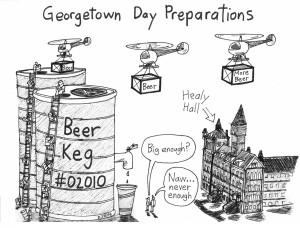As the members of this senior class prepare to leave their temporary home on the Hilltop, and already we begin to plan for the arrival of a new group of freshmen who will take their place for the next four years, it is a time of remembrance and anticipation – it is a time of goodbyes and welcomes, of celebration and anxiety.
It is also, I hope, the beginning of a life of curiosity and a life of reading. The degree about to be conferred upon the graduates suggests that a certain expertise has been achieved. It intimates that a body of knowledge has been entered into and mastered through the many courses in general education and then in one or several majors.
But, in fact, the degree should be viewed as a marker of ignorance. What is conferred is the ignorance acknowledged by Socrates, that one above all gains through education not knowledge. It is a deepening realization of how little one actually knows – or can ever know.
Several nights ago I attended a gathering – calling itself a “salon” – in the town of Reston, Va., where I had been invited to speak about the thought of Alexis de Tocqueville. The age of the participants ranged from a recent college graduate to the octogenarian founder of the town of Reston. Every attendee was present out of a desire to learn about a thinker who they had heard or once learned had important things to say about democracy. I talked for a time about Tocqueville – his life, his thought, what I believed to be its implications for our politics today – and for several hours over wine and light fare we talked about the theory and practice of democracy.
embers of this salon gather about once a month with invited guests who speak about every possible subject from physics to botany, from physiology to philosophy. At the end of the evening there were handshakes and chitchat, a few who lingered (just like in college) for some extra time with the professor, and then we evaporated into the evening where chores or the prospect of work awaited in the morning. There was no exam, no assessment, no grade. There was only the hunger to know and the effort of people to come together to fill that void.
Over the years, I have served on several committees charged with the question, What are we to teach our students, and how are we to know that it is being effectively taught? Today there are growing concerns over “assessment” – adequate measurements of learning that can be shown to accreditation agencies and bureaucrats. Without intent to be flippant, my own argument has been that we should “assess” by asking our graduates one key question at five-year intervals after graduation: What have you been reading? By this measure, the activities of this Salon would be proof that their educations had been a success. Having learned how much they did not know and that their education had only begun, they gathered to do something about it.
This is also the time of year when lines form of students selling back the books of completed courses. There is part of me that sympathizes with this impulse – many of the books are textbooks that cost too much and will be outdated in a year or two. But I also witness returns of classics – books by Shakespeare, Plato, Dante – works that ought to be lifelong companions, silent friends waiting to be taken down and rediscovered.
Yes, we live in the age of the Kindle and Google Books, so perhaps the longstanding burden of lugging around heavy boxes of books over the course of one’s life is coming to an end. But none of these new electronic forms will easily replace the real companionship that a wall of books never fails to invoke – the invitation to “take and read,” the sense of being beckoned. If a Georgetown education should have provided anything, it is the understanding that we are only beginning to learn to know our condition and ourselves. This ending is artificial, marking only a beginning.
These have been four years of intentional confusion. Students are told, on the one hand, that the knowledge they gain in their courses is invaluable as an end in itself – that to be human is to hunger to know oneself and one’s world. At the same time, from every direction, students are told that their courses are means to an end – the world of employment.
The first thing one sees upon entering the student center is the Career Education Center – a daily reminder of what Georgetown implicitly promises. Today is a good time to think, too, about the likes of people in that salon. They have held jobs. Some had attained several degrees. Some had even founded cities. But still they hunger to know.
I hope you will too.
Patrick Deneen is an associate professor in the government department. He can be reached at deneenthehoya.com. This is his final installment of Against the Grain.
*To send a letter to the editor on a recent campus issue or Hoya story or a viewpoint on any topic, contact opinionthehoya.com. Letters should not exceed 300 words, and viewpoints should be between 600 to 800 words.*”








